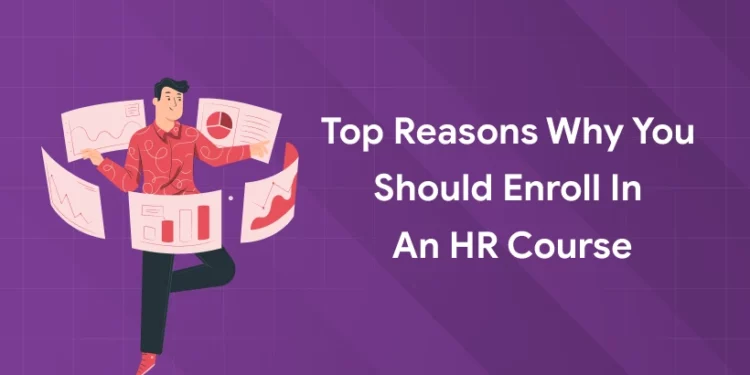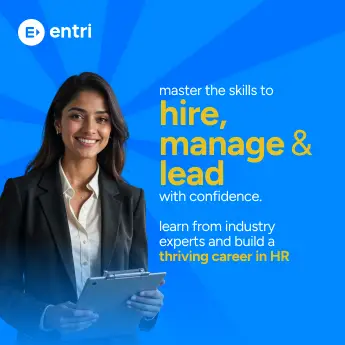Table of Contents
Key Takeaways:
- HR in 2026 is a strategic, technology-enabled function that directly shapes business performance, culture, and employee experience.
- A modern HR course trains you in recruitment, HR operations, performance management, learning and development, compliance, and HR analytics—not just basic admin work.
- HR offers multiple career paths, from generalist and talent acquisition roles to HR analytics, L&D, and HR business partnering, across all major industries.
- Flexible online and blended HR courses make it easier for freshers and working professionals to upskill or switch careers without a complete break.
- A structured program like Entri’s HR Management Course, with practical content and placement assistance, can significantly improve your chances of breaking into and growing within the HR domain.
Introduction
Think about the last time you heard someone say, “People are our greatest asset.” In 2026, this line is no longer a cliché—it is the competitive advantage every business is fighting to protect. Companies are investing heavily in employee well-being, hybrid work models, diversity, and leadership pipelines. At the center of all these changes stands one function: Human Resources. If you have ever found yourself mediating conflicts in a group, guiding friends on career decisions, or feeling curious about how companies hire, reward, and retain talent, an HR career might fit you better than you think.
At the same time, technology is rewriting the HR playbook. Artificial intelligence in hiring, HR analytics dashboards, and digital HR platforms are now standard. Organizations need professionals who can combine empathy with data, processes with people, and strategy with culture. That is exactly what a well-designed HR course can help you build. This blog walks through the top reasons to enroll in an HR course in 2026, while answering the questions most people ask before leaping—about demand, skills, salaries, flexibility, and real career outcomes.
Why is HR such a smart career choice in 2026?
HR has transformed from a purely administrative department to a strategic partner that shapes business performance, culture, and long-term growth. Modern HR professionals are involved in everything from workforce planning and employer branding to leadership development and digital transformation initiatives. When organizations expand, restructure, or adopt new technologies, HR is one of the first teams at the table.
Because people-related decisions have direct financial and reputational impact, skilled HR professionals are now seen as critical assets rather than back-office support. For someone entering or upskilling in 2026, this means HR is not just “safe”; it is a future-ready, evolving field with scope for influence and leadership.
You might also like: How to Become an HR Professional: Step-by-Step Guide
Become an HR Expert – Enroll in Our HR Management Course Today!
Unlock the secrets to effective Human Resource Management with our expert-led course! Learn recruitment, employee relations, performance management, and more to build a thriving workplace. Start your journey toward a successful HR career today!
Know MoreHow strong is the demand for HR professionals?
The demand for HR professionals is being driven by several powerful trends:
- Rapid growth of hybrid and remote work, which requires structured policies, engagement strategies, and digital HR processes.
- Heightened focus on employee mental health, work-life balance, and long-term retention, making people management a board-level priority.
- Increased compliance requirements and reputational risks, pushing companies to strengthen HR policies, documentation, and ethical practices.
In many markets, organizations are actively building HR centers of excellence for talent acquisition, learning and development, and HR analytics. This creates opportunities for entry-level professionals, mid-career switchers, and experienced HR specialists alike. With new-age roles emerging in areas like people analytics and DEI (Diversity, Equity, and Inclusion), an HR background in 2026 comes with strong job visibility and stability.
Also read: Arts Student’s Guide to a Career in HR
What modern skills will an HR course actually teach?
A good HR course today goes far beyond basic hiring and payroll. It blends core people skills with business acumen and technology. Typically, you can expect to learn:
- Recruitment and talent acquisition: Job design, sourcing strategies, competency-based interviews, employer branding, onboarding, and candidate experience.
- HR operations and compliance: Policies, documentation, contracts, labor laws, statutory compliances, and grievance handling.
- Performance management and rewards: Goal setting, appraisal systems, feedback frameworks, compensation and benefits, and incentive design.
- Learning and development: Training needs analysis, designing learning paths, coaching, leadership development, and evaluating training ROI.
- HR analytics and digital tools: Using HRIS/HRMS, payroll software, ATS, dashboards, basic data interpretation, and reporting.
- Culture and engagement: Building engagement programs, recognition systems, well-being initiatives, and internal communication strategies.
This combination prepares you to handle real HR work from day one rather than staying stuck at a theoretical level.
People also read: Non-IT Students’ Guide to HR
What careers can HR courses lead to?
One of the biggest questions people have is: “What can I become after an HR course?” HR opens up multiple job roles depending on your interest—people interaction, data, strategy, or operations. Here is a simple view of common HR roles and what they typically focus on. You can layer local salary ranges based on your target geography.
Common HR roles and focus areas
| HR Role | Primary Focus | Typical Fit For |
|---|---|---|
| HR Generalist | Day-to-day HR operations, employee queries, documentation, policy execution | Those who like variety, multitasking, and people interaction |
| Talent Acquisition Specialist | Hiring, sourcing, interviews, employer branding | People who enjoy networking, communication, and fast-paced work |
| HR Executive / HR Coordinator | Admin support, HR data updates, onboarding, joining formalities | Freshers starting out in HR |
| HR Business Partner (HRBP) | Strategic HR support to business units, workforce planning, advisory | Experienced HRs who enjoy strategy and leadership interaction |
| Learning & Development (L&D) | Training design, skill development, leadership programs | Those passionate about teaching, coaching, and content creation |
| HR Analyst | HR dashboards, metrics, trend analysis, data-backed recommendations | Analytical, Excel/BI-friendly professionals |
| Employee Relations Specialist | Conflict resolution, engagement, discipline, grievance handling | Strong listeners and mediators with high emotional intelligence |

Become an HR Expert – Enroll in Our HR Management Course Today!
Unlock the secrets to effective Human Resource Management with our expert-led course! Learn recruitment, employee relations, performance management, and more to build a thriving workplace. Start your journey toward a successful HR career today!
Know MoreHow is HR shaping the future of work?
In 2026, HR is deeply involved in questions like:
- How do we keep employees engaged in remote or hybrid environments?
- How can AI tools be used ethically in screening candidates?
- What policies are needed to support gig workers, freelancers, and flexible talent?
- How do we build inclusive workplaces where diverse employees feel valued?
HR teams are leading initiatives around diversity and inclusion, hybrid work guidelines, performance redesign, and continuous feedback systems. They also help leaders manage change—whether that is implementing a new HR tech platform, reorganizing teams, or rethinking roles due to automation.
An HR course that covers these themes prepares you not just for today’s jobs, but for a future where work will keep changing. You learn to think beyond transactions and contribute to long-term people strategy.
You might also like: How Gen Z is Forcing HR to Rewrite the Rules of Workplace
How flexible are HR courses and learning options in 2026?
One of the best things about starting HR in 2026 is the variety of learning formats available:
- Online HR management courses for working professionals who need flexibility.
- Hybrid or weekend programs for those who prefer some classroom interaction.
- Short-term certification programs focused on specialized areas like HR analytics, talent acquisition, or labor laws.
- Longer postgraduate programs for those who want deep academic exposure or plan to pursue leadership roles later.
Many of these courses include case studies, simulations, role plays, assignments, and even exposure to HR software. For someone already working in another field, this flexibility means you can transition into HR without putting your career completely on hold.
Is being an HR professional your dream? Enrol now for our course on Human Resources!
Who should seriously consider an HR course in 2026?
An HR course can be a smart move if you fall into any of these profiles:
- Recent graduates who enjoy working with people and want a structured, professional career path.
- Career switchers from domains like operations, administration, sales, or customer service who often handle people responsibilities informally and want to formalize that into HR.
- Existing HR professionals who learned on the job and now want to strengthen their fundamentals, technology skills, and strategic thinking.
- Entrepreneurs or small business owners who manage teams and want a better grip on hiring, policies, and performance management.
If you like listening, organizing, solving people’s problems, and thinking about fairness and growth, HR will feel less like a job and more like a meaningful career path.
How do HR certifications and structured courses add value?
While it is possible to enter HR through entry-level roles, structured courses and certifications accelerate your path and credibility. They:
- Give you a recognized qualification that you can showcase to recruiters, especially if you are a fresher or changing careers.
- Help you speak the language of HR—terms like CTC structure, competency mapping, succession planning, or attrition analysis.
- Often include projects or internships that make your resume stronger.
- Provide a stepping stone if you eventually aim for global certifications such as SHRM or HRCI.
In competitive job markets, a well-designed HR course can be the difference between being shortlisted and being overlooked.
Also read: Top Online HR Management Courses in Kerala
How can Entri’s HR Management Course help you in 2026?
If you are looking for a structured, practical starting point, Entri’s HR Management Course is built to bridge exactly this gap between theory and real-world HR practice.
What does Entri’s HR Management Course offer?
- Job-focused curriculum: Topics typically include recruitment and selection, HR operations, payroll basics, performance management, HR policies, labor law fundamentals, and introductory HR analytics. The content is curated to align with what entry-level and growing HR roles actually demand in today’s market.
- Practical learning: Sessions are designed to give you exposure to real HR formats such as offer letters, HR emails, policy drafts, and basic HR reports. You also learn how HR processes work end-to-end, so you can confidently handle tasks in your first role.
- Placement assistance: One of the biggest advantages is guided placement support—this can include help with resumes, interview preparation, and connecting you with hiring partners where possible. It is especially useful if you are a fresher or a career switcher with no prior HR work experience.
- Flexible learning: The course is delivered in a format suitable for learners from Kerala and beyond, with convenient access to sessions and study materials so you can learn alongside your existing job or studies.
- Skill-building for future growth: By the end of the course, you are better prepared not only for immediate roles like HR Executive, HR Assistant, or Recruiter, but also to continue into advanced studies, certifications, or specialized HR domains over time.
If your goal is to enter the HR field with clarity, confidence, and support, this type of structured program can save you months of trial-and-error learning on the job.
Also read: Online vs Offline HR Courses: Which One Should You Choose?
Conclusion
Choosing to enroll in an HR course in 2026 is more than an academic decision—it is a step towards a people-centered, impactful, and future-relevant career. As organizations continue to rethink how they hire, manage, and grow their people, HR professionals who understand both human behavior and business realities will always be in demand.
If you are ready to move beyond curiosity and turn your interest in people, culture, and careers into a profession, this is the right time to start. With the right HR course, especially one that combines practical learning with placement support like Entri’s HR Management Course, you give yourself a strong, structured entry into a field that will continue to matter no matter how work evolves.
| Related Links | |
| Top Human Resource Blogs to Follow | How to build a remote HR career |
| HR Certification vs HR Degree | Which one to choose? | 15 HR Intern Interview Questions and Sample Answers |
Become an HR Expert – Enroll in Our HR Management Course Today!
Unlock the secrets to effective Human Resource Management with our expert-led course! Learn recruitment, employee relations, performance management, and more to build a thriving workplace. Start your journey toward a successful HR career today!
Know MoreFrequently Asked Questions
Is HR a good career choice if I am not very “numbers-oriented”?
Yes. While HR analytics is growing, many HR roles focus on communication, problem-solving, empathy, and relationship-building. Basic comfort with data helps, but you do not have to be a hardcore numbers person to succeed.
Can I switch to HR from a completely different background?
Absolutely. Many successful HR professionals started in sales, operations, teaching, hospitality, or administration. An HR course helps you translate your existing experience into HR language and build the foundational knowledge you need.
Do I need a full MBA in HR, or is a shorter course enough to start?
You do not always need a full MBA to get your first HR role. Shorter, targeted HR courses can be enough to start as an HR Executive, HR Assistant, or Recruiter. You can always pursue an MBA or advanced certifications later once you confirm your interest and gain experience.
What kind of companies hire HR freshers?
Startups, SMEs, staffing agencies, BPOs, and mid-sized companies frequently hire HR freshers for generalist, recruitment, or coordination roles. Larger corporates may prefer candidates with a strong course background, internship, or some prior exposure.
How soon can I expect a job after completing an HR course?
Timelines vary based on your location, prior experience, and networking effort. However, having a structured course, projects, and placement assistance often speeds up the process compared to applying with no HR foundation.













